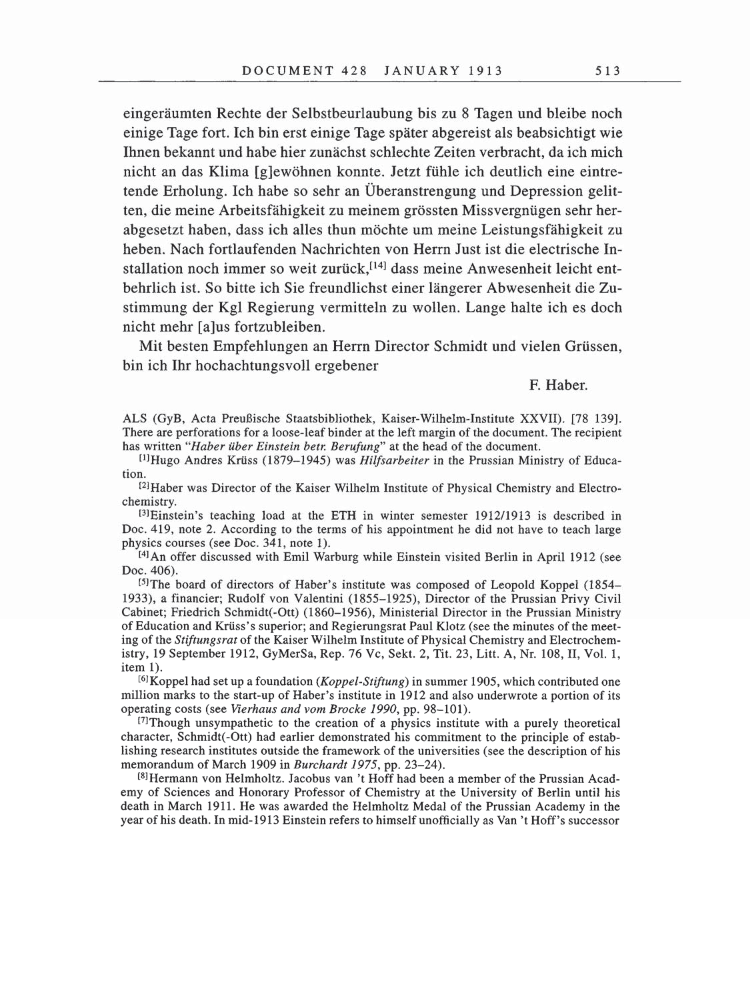DOCUMENT 428 JANUARY 1913 513 eingeräumten Rechte der Selbstbeurlaubung bis zu 8 Tagen und bleibe noch einige Tage fort. Ich bin erst einige Tage später abgereist als beabsichtigt wie Ihnen bekannt und habe hier zunächst schlechte Zeiten verbracht, da ich mich nicht an das Klima [g]ewöhnen konnte. Jetzt fühle ich deutlich eine eintre- tende Erholung. Ich habe so sehr an Überanstrengung und Depression gelit- ten, die meine Arbeitsfähigkeit zu meinem grössten Missvergnügen sehr her- abgesetzt haben, dass ich alles thun möchte um meine Leistungsfähigkeit zu heben. Nach fortlaufenden Nachrichten von Herrn Just ist die electrische In- stallation noch immer so weit zurück,[14] dass meine Anwesenheit leicht ent- behrlich ist. So bitte ich Sie freundlichst einer längerer Abwesenheit die Zu- stimmung der Kgl Regierung vermitteln zu wollen. Lange halte ich es doch nicht mehr [a]us fortzubleiben. Mit besten Empfehlungen an Herrn Director Schmidt und vielen Grüssen, bin ich Ihr hochachtungsvoll ergebener F. Haber. ALS (GyB, Acta Preußische Staatsbibliothek, Kaiser-Wilhelm-Institute XXVII). [78 139]. There are perforations for a loose-leaf binder at the left margin of the document. The recipient has written "Haber über Einstein betr. Berufung" at the head of the document. [1]Hugo Andres Krüss (1879-1945) was Hilfsarbeiter in the Prussian Ministry of Educa- tion. [2]Haber was Director of the Kaiser Wilhelm Institute of Physical Chemistry and Electro- chemistry. [3]Einstein's teaching load at the ETH in winter semester 1912/1913 is described in Doc. 419, note 2. According to the terms of his appointment he did not have to teach large physics courses (see Doc. 341, note 1). [4]An offer discussed with Emil Warburg while Einstein visited Berlin in April 1912 (see Doc. 406). [5]The board of directors of Haber's institute was composed of Leopold Koppel (1854- 1933), a financier Rudolf von Valentini (1855-1925), Director of the Prussian Privy Civil Cabinet Friedrich Schmidt(-Ott) (1860-1956), Ministerial Director in the Prussian Ministry of Education and Kriiss's superior and Regierungsrat Paul Klotz (see the minutes of the meet- ing of the Stiftungsrat of the Kaiser Wilhelm Institute of Physical Chemistry and Electrochem- istry, 19 September 1912, GyMerSa, Rep. 76 Vc, Sekt. 2, Tit. 23, Litt. A, Nr. 108, II, Vol. 1, item 1). [6]Koppel had set up a foundation (Koppel-Stiftung) in summer 1905, which contributed one million marks to the start-up of Haber's institute in 1912 and also underwrote a portion of its operating costs (see Vierhaus and vom Brocke 1990, pp. 98-101). [7]Though unsympathetic to the creation of a physics institute with a purely theoretical character, Schmidt(-Ott) had earlier demonstrated his commitment to the principle of estab- lishing research institutes outside the framework of the universities (see the description of his memorandum of March 1909 in Burchardt 1975, pp. 23-24). [8]Hermann von Helmholtz. Jacobus van't Hoff had been a member of the Prussian Acad- emy of Sciences and Honorary Professor of Chemistry at the University of Berlin until his death in March 1911. He was awarded the Helmholtz Medal of the Prussian Academy in the year of his death. In mid-1913 Einstein refers to himself unofficially as Van 't Hoff's successor
